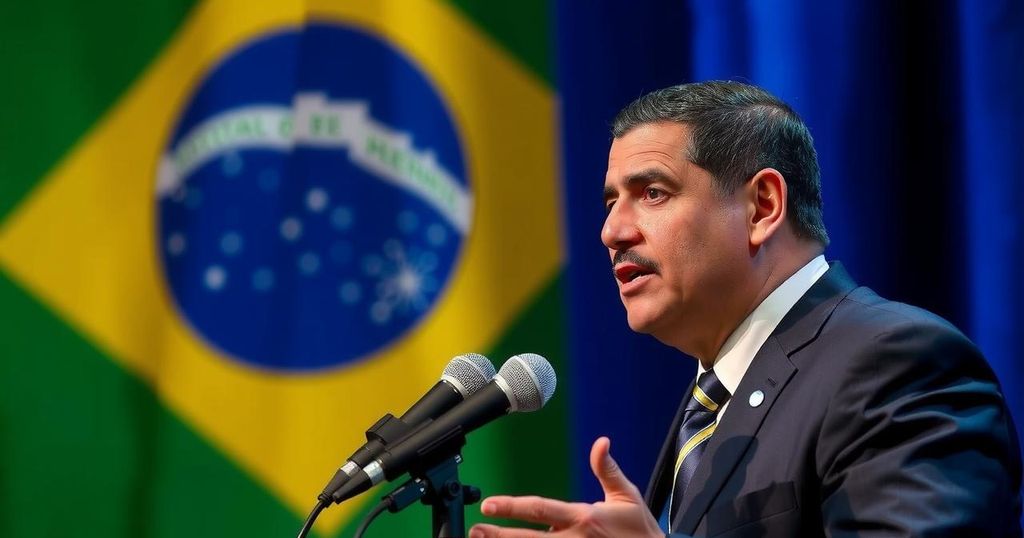Maduro Attributes Venezuela’s BRICS Exclusion to Brazilian Diplomat’s Veto
President Nicolás Maduro claims Venezuela’s exclusion from the XVI BRICS Summit was due to a last-minute veto by a Brazilian diplomat, counter to assurances from Brazil’s Foreign Minister. This incident has escalated tensions between Venezuela and Brazil amid ongoing disputes regarding the legitimacy of recent elections in Venezuela, raising broader questions about regional diplomacy and economic recovery linked to BRICS membership.
On October 29, 2024, Venezuelan President Nicolás Maduro addressed the exclusion of Venezuela from the recent XVI BRICS Summit held in Kazan, Russia. During a televised broadcast, he attributed the apparent veto to Brazil to a diplomat named Eduardo Paes Saboia, despite prior assurances from Brazil’s Foreign Minister Mauro Viera that there would be no obstacles for Venezuela’s entry. Maduro expressed disappointment, labeling the situation as a “stab in the back” driven by Saboia, whom he described as a fascist and a supporter of former Brazilian President Jair Bolsonaro. This political maneuvering by Brazil’s foreign service, Itamaraty, which Maduro claimed has historically been aligned with U.S. interests, has increased diplomatic tensions between Caracas and Brasilia. The latter had already become strained due to concerns over the results of Venezuela’s July 28 presidential election, which saw Maduro proclaimed the winner amidst allegations of fraud from the opposition. Brazilian President Luiz Inácio Lula da Silva, who did not attend the summit, has yet to respond to Maduro’s statements, although he has hinted at potential repercussions for bilateral relations. Venezuela has been campaigning for BRICS membership for several years, viewing it as a critical opportunity amidst the economic devastation brought on by U.S. sanctions. Maduro emphasized the urgent need for BRICS to create alternative financial systems that are not dominated by Western powers, particularly as U.S. sanctions have hindered Venezuela’s ability to trade oil effectively on the international market. At the Kazan summit, Maduro called for the BRICS bank to play a significant role in facilitating such funding alternatives, referencing the need for independent financing mechanisms as the Venezuelan government faces mounting economic challenges due to external pressures and internal corruption issues within the oil sector. Overall, Maduro’s remarks reflect both his frustration with Brazil’s unexpected veto and his ongoing push for support from BRICS to aid Venezuela’s beleaguered economy.
The BRICS is a coalition of emerging economies comprised originally of Brazil, Russia, India, China, and South Africa. The group aims to promote cooperation and establish a multipolar world order. For some years, Venezuela has sought to join this bloc as a means to counterbalance U.S. sanctions and unify with other like-minded nations. The recent summit, however, resulted in a disappointment for Caracas, as its application was vetoed by Brazil, leading to increased diplomatic friction between the two nations. This incident underscores the complex political dynamics in the region, particularly the lingering effects of past Brazilian leadership and ongoing scrutiny over the Venezuelan electoral process.
In summary, President Maduro’s discontent regarding Venezuela’s exclusion from the BRICS bloc highlights the intricate geopolitical relationship between Venezuela and Brazil, underscored by assurances that were allegedly undermined by local diplomatic actions. This incident not only illustrates the challenges Venezuela faces in its efforts for international acceptance and support amidst U.S. sanctions but also raises questions about the cohesiveness of BRICS as a counterweight to Western hegemony in global affairs.
Original Source: venezuelanalysis.com




Post Comment